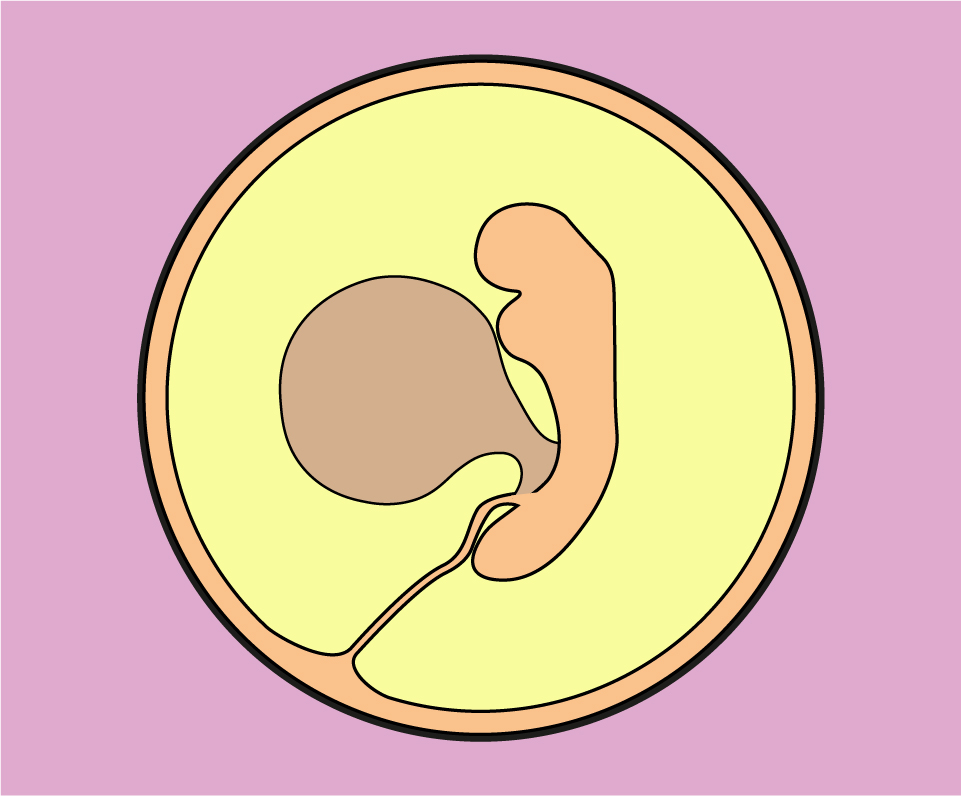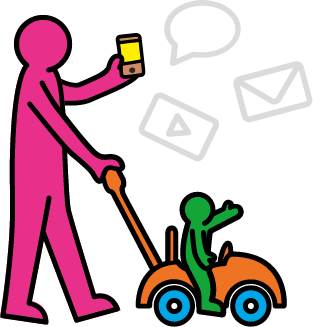Week-by-week guide to pregnancy

1st trimester
Our week-by-week pregnancy guide is full of essential information. From early pregnancy symptoms to how your baby is growing and developing, you'll find it all here.
Week 7 – your 1st trimester
Have you started to share the news yet? When you start telling friends and family is entirely up to you. Legally you do not have to tell your employer until the 15th week before the baby is due, which is about 4 months away. Maternity Action explains more about your maternity rights.
What's happening in my body?
There's more blood pumping around your body than there was 7 weeks ago. As you go through your pregnancy, the volume will increase by up to 50%. The extra blood will feed your uterus (womb) with all the oxygen and nutrients that your baby needs. This can make you feel thirstier than usual. Try to drink 8 medium glasses of fluid a day (such as water, fruit tea, fruit juice, skimmed or semi skimmed milk).
Meanwhile, your womb is now about the size of a lemon, while your baby is the size of a grape and growing very quickly.
If it's your first pregnancy, you may not start looking pregnant until around week 12. If you have had a baby before, you may look pregnant earlier than you did last time, as your womb and stomach muscles will be more stretched.
Sign up for emails
Get more tips and advice on your pregnancy, baby and parenting sent to your inbox.
Early pregnancy symptoms (at 7 weeks)
Being 7 weeks' pregnant can feel quite challenging if you are feeling sick, tired and experiencing mood swings. Your symptoms could also include:
- a metallic taste in your mouth
- sore breasts
- headaches
- new food and drink likes and dislikes
- a heightened sense of smell
- a white milky pregnancy discharge from your vagina
- light spotting (see your doctor if you get bleeding in pregnancy)
- cramping, a bit like period pains
- darkened skin on your face or brown patches - this is known as chloasma or the "mask of pregnancy"
- thicker and shinier hair
- bloating (read about bloating on week 16's page)
See week 6 for morning sickness remedies.
Read Tommy's guide to common pregnancy symptoms.
Don't ignore any strange symptoms, like feeling itchy all over. The chances are that those aches or pains are just signs of a normal pregnancy, but talk to your midwife or doctor, just in case.
What does my baby look like?
Your baby, or embryo, is around 10mm long from head to bottom, which is about the size of a grape. The brain is growing faster than the rest of the body, so they have a large forehead. There are small dimples where the nose and ears will be. The eyelids are beginning to grow and cover the eyes.
The little limb buds are starting to form cartilage which will make the bones for the arms and legs. The arm buds are getting longer, and the flattened ends will soon become tiny hands.
The baby's brain and spinal cord are taking shape at a fast pace. Your embryo is generating around 100 new brain cells every minute. Remember to take your folic acid as it can help prevent defects in your baby's development.

Action stations
Share the news with your GP or ask for an appointment with a midwife at your doctors' surgery. Alternatively you can refer yourself to your local hospital – look for contact details on their website.
You'll need to arrange a booking appointment. This usually takes place between weeks 8 and 12 and takes around an hour. You can talk about the options for your pregnancy and the birth. You will also be offered screening tests for infectious diseases, and conditions such as Down's syndrome. You could ask about the Maternity Transformation Programme and how it could benefit you.
You will be offered your first dating scan at 8 to 14 weeks.
If it's your first pregnancy you will probably have around 10 appointments and 2 scans in total.
Ask your midwife or doctor about online antenatal classes – they may be able to recommend one. The charity Tommy's has lots of useful information on antenatal classes and preparing you for birth.
Antenatal classes will give you the chance to meet other people and prepare you for parenthood. The NCT offers online antenatal classes with small groups of people that live locally to you.
Do your best to stop smoking, give up alcohol and go easy on the tea, coffee and anything else with caffeine. Ask your midwife or GP for support if you feel you need it.
Take prenatal vitamins. You're advised to take 400 micrograms of folic acid, every day, until at least week 12. This helps your baby's nervous system to form and offers some protection from conditions such as spina bifida.
To keep bones and muscles healthy, we need vitamin D. From late March/early April to the end of September, most people make enough vitamin D from sunlight on their skin. However, between October and early March, consider taking a daily vitamin D supplement because we cannot make enough from sunlight.
Some people should take a vitamin D supplement all year round, find out if this applies to you on the NHS website. You just need 10 micrograms (it's the same for grown-ups and kids). Check if you're entitled to free vitamins.
Do you think you or your partner could have a sexually transmitted infection (STI)? If so, get checked out, as this could affect your baby's development. Talk to your midwife or GP, or visit a sexual health clinic.
It's recommended that you do 150 minutes of exercise a week while pregnant. You could start off with just 10 minutes of daily exercise - perhaps take a brisk walk outside. Check out Sport England's #StayInWorkOut online exercises (scroll to the pregnancy section). Listen to your body and do what feels right for you.
There's no need to eat for 2. If you pile on the pounds, you could put you and your baby at risk of health problems such as high blood pressure. Eat healthily, with plenty of fresh fruit and veg, and avoid processed, fatty and salty foods. You may be able to get free milk, fruit and veg through the Healthy Start scheme.
If you have a long-term health condition, then let your specialist or GP know that you're pregnant as soon as possible. Do not stop taking any regular medication without discussing it first with your doctor.
How are you today? If you're feeling anxious or low, then talk to your midwife or doctor who can point you in the right direction to get all the support that you need. You could also discuss your worries with your partner, friends and family.
You may be worried about your relationship, or money, or having somewhere permanent to live. Don't keep it to yourself. It's important that you ask for help if you need it.
You and your family should follow the government and NHS guidance on coronavirus (COVID-19):
To find out about about COVID-19 and pregnancy, childbirth and breastfeeding, have a look at advice on the:
Losing a baby
A miscarriage is the loss of a baby in the first 23 weeks. The NHS website has information on the symptoms, causes and what happens during a miscarriage..
Want to know when the baby's due?
Use the NHS's pregnancy due date calculator. You'll get a more accurate date from your doctor or midwife when you have a dating scan (usually at 8 to 14 weeks).

Sign up now for our pregnancy, baby and toddler guide
Get personalised emails for trusted NHS advice, videos and tips on your pregnancy week by week, birth and parenthood.